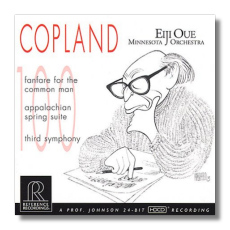
The Internet's Premier Classical Music Source
Related Links
- Copland Reviews
- Latest Reviews
- More Reviews
-
By Composer
-
Collections
DVD & Blu-ray
Books
Concert Reviews
Articles/Interviews
Software
Audio
Search Amazon
Recommended Links
Site News
 CD Review
CD Review
Aaron Copland

Copland 100
- Fanfare for the Common Man
- Suite "Appalachian Spring"
- Symphony #3
Minnesota Orchestra/Eiji Oue
Reference Recordings RR-93CD
The Minnesota Orchestra has a rich history of excellence when it comes to Copland, both on record and with the various music directors who have led the ensemble. That tradition is gloriously upheld in this 2000 tribute program. As always, Oue leads his marvelous players with distinction, and the sound is top notch. If you're in a hurry, you can stop reading there. It's that good.
But if you care to read on, I'll bet money that this is one of the best versions of the Fanfare committed to disc. It's the actual fanfare, as opposed to the truncated and unsatisfying symphonic version used by Bernstein and the composer himself. The sound here is incredible, a tribute to the engineers as much as to the Minnesota brass. As for the playing, it's deeply moving as well as triumphant.
As I've noted before, the suite has been well recorded by nearly everyone with an interest in American music who wields a baton. Former Minnesota music directors Eugene Ormandy and especially Antal Doráti made the piece their own. Whether in Detroit or Minneapolis, Doráti's Copland recordings – captured in stunning sound on Decca and Mercury – stand as references even today. Oue may not be the showiest conductor working today, but he sure knows what he's doing. He coaxes absolutely lovely playing from his charges, giving the piece a great fluidity and tenderness. Wind playing is exceptional, and the excellent sonics give the rendition an absolutely huge dynamic range that flatters all sections. In this day and age, it's challenging to pick a "best" reading of this work, but this is exceptional by any standard.
What might shift this disc from excellent to essential is a magnificent reading of the composer's Symphony #3. Not only is the playing uniformly brilliant, but it's arguably the best rendition out there. The playing is generally superior to Bernstein's late DG recording, and certainly more cogent than Järvi's decent but uncompetitive version on Chandos. That leaves Lenny's early CBS recording, a landmark of that conductor's discography as well as the composer's. Oue simply gets better sound and arguably better playing. Oue was a Bernstein prodigy at Tanglewood anyways, so comparisons could last all day. The Minnesota Orchestra simply plays the daylights out of the piece, with stupendous brass playing the highlight of it all. Rhythmically, Oue doesn't put a foot wrong. The dancing figures in the second movement are a delight, the third movement is wonderfully done, and the finale is the most moving and noble on disc. Coupled with as fine a suite as you'll hear, this is a triumph for all involved and a must if you care about the composer.
Copyright © 2013, Brian Wigman





















